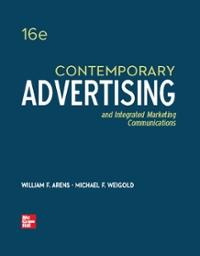Question
what are your thoughts on the post below. Hypothesis:In the denial of privilege, research leads us to believe there are two main psychological factors. They
what are your thoughts on the post below.
Hypothesis:In the denial of privilege, research leads us to believe there are two main psychological factors. They are meritocratic and group-image threat. We theorize that there are other factors. While the previous two threats relate to conscious denial we believe ignorance of self privilege plays a role in denial. Also, there is a large part of the population that benefits from privilege so rather than try and fix the problem they rather deny it exists to keep their privileged status intact.
Methods: As our hypothesis continues to evolve we have utilized any and all information we could find. This has involved using the school website and searching for relevant academic papers and analyzing the date they contain.As our hypothesis stands now, we are going to need to create our own study. Our hypothesis is fairly novel and requires us to find our own data. We plan to do this through the use of a questionnaire to as many people as will take it. The questions will revolve around whether they believe they have privilege and in what way. We will then determine if they have come from a privileged group and analyze the results to see if there are any patterns. We will then utilize the demographic information to help determine our results. We are hoping this will help prove or disprove our hypothesis.
People deny privilege to promote their self-worth to the detriment of others in society. Some individuals have advantages and we refer to this as Privilege."... privilege perpetuates inequity by giving unearned advantages to certain groups over others." (Philips & Lowery, 2020)When people are confronted with the reality of their privilege, many people choose to deny they have unfair advantage(s).
In the denial of privilege, research leads us to believe there are two main psychological factors."...whiteness defines a problematic social identity that confronts Whites with 2 psychological threats: the possibility that their accomplishments in life were not fully earned (meritocratic threat) and the association with a group that benefits from unfair social advantages (group-image threat). We theorize that Whites manage their racial identity to dispel these threats." (Knowles et al, 2014) We theorize that there are other factors.While the previous two threats relate to conscious denial we believe ignorance and a lack of self awareness play a role in denial. Also, there is a part of the population that benefits from privilege so rather than try and fix the problem they rather deny it exists to keep their privileged status intact.
Privileges have existed throughout history. Harris & Twomey (2019) proposed that progress in civilization, civic and economic, requires reducing the concentration of privileges. There are many who have worked towards eliminating this divide but there are those who work to maintain division. Philips and Lowery (2018) explained that the civil rights movement is evidence of the United States finding its moral compass but this ignores the large population that fought against civil rights. An example of this today is the resistance to the Black Lives Matter movement.
White privileged individuals have seen the injustices that are caused by the lack of equity, yet many are resistant to change. Knowles et al (2014) points out that Whites have difficulty seeing that their perceptions of the world are seen through the lens of racial group membership. This whiteness holds power in its ability to fade into the background without ever having to be acknowledged, thus enabling a wide range of privileges to white group members.(Knowles, et al, 2014)
Whites have experienced ingrained privileges for so long as part of our culture that some are not aware of its existence. This has led to some whites maintaining they do not have advantages even when inequalities are presented. Philips and Lowery (2018) define this as herd invisibility, "individuals acting to protect their own innocence leads to the emergence of invisibility at the societal level. A herd invisibility results, protecting both the innocence and privileges of individual Whites, but without their necessarily having to act on individual innocence or maintenance motivations."
As individuals and groups have continued to benefit from these privileges, they fail to see the disparity of rights that others should enjoy equally. The "fluid and dynamic perspectives on privilege shift focus from disadvantaged individuals' active struggles against oppression versus advantaged people's passive maintenance of privilege." (Atewologun & Sealy, 2014)
Step by Step Solution
There are 3 Steps involved in it
Step: 1

Get Instant Access to Expert-Tailored Solutions
See step-by-step solutions with expert insights and AI powered tools for academic success
Step: 2

Step: 3

Ace Your Homework with AI
Get the answers you need in no time with our AI-driven, step-by-step assistance
Get Started


